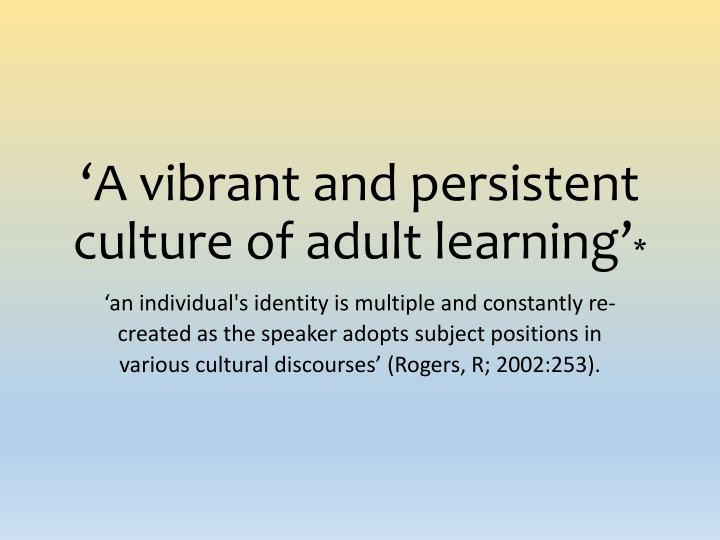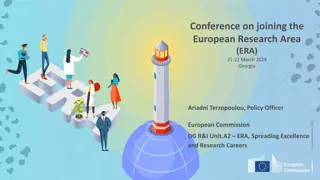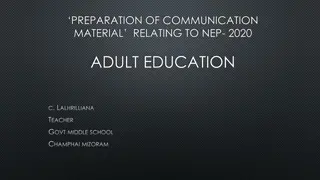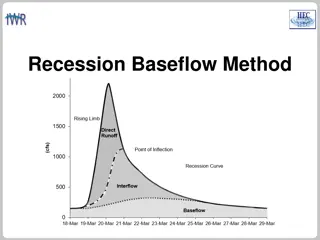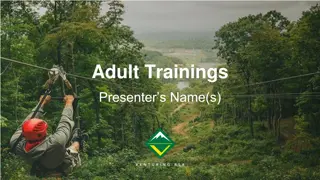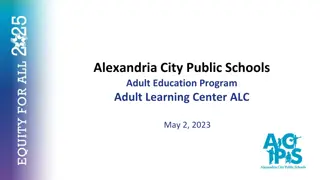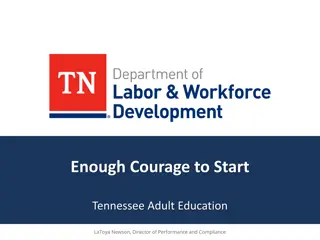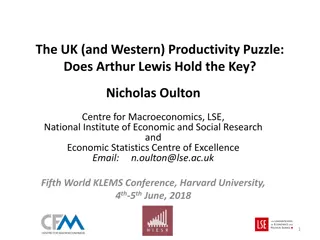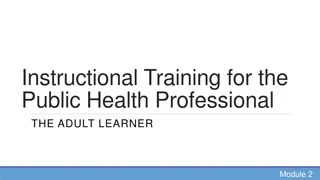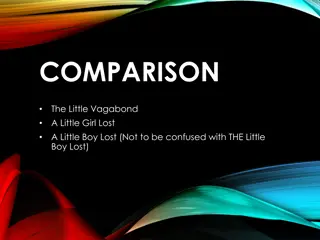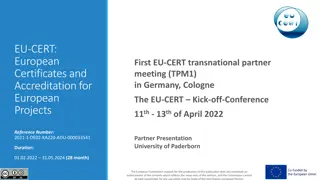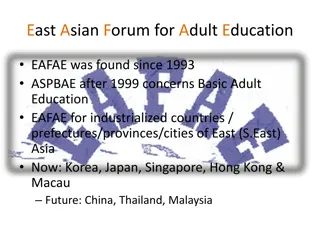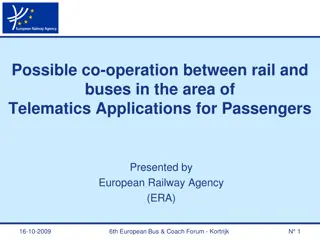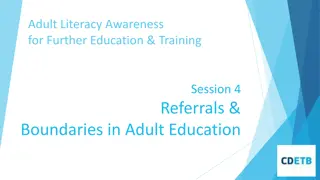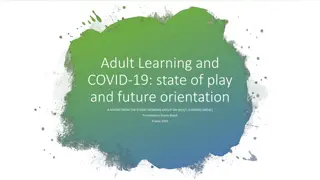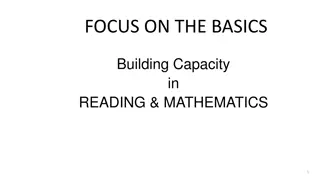Lost Potential: Adult Education in an Era of Recession
The research explores the impact of deep economic recession on adult education, highlighting the loss of opportunities for adult learners. It emphasizes the importance of adult education as an investment that leads to improved skills, productivity, and various intangible benefits beyond economic gains. The study challenges the perception of adult education as a secondary priority compared to traditional education sectors, emphasizing its significant positive impacts on individuals and society as a whole.
Uploaded on Sep 11, 2024 | 1 Views
Download Presentation

Please find below an Image/Link to download the presentation.
The content on the website is provided AS IS for your information and personal use only. It may not be sold, licensed, or shared on other websites without obtaining consent from the author.If you encounter any issues during the download, it is possible that the publisher has removed the file from their server.
You are allowed to download the files provided on this website for personal or commercial use, subject to the condition that they are used lawfully. All files are the property of their respective owners.
The content on the website is provided AS IS for your information and personal use only. It may not be sold, licensed, or shared on other websites without obtaining consent from the author.
E N D
Presentation Transcript
A vibrant and persistent culture of adult learning * an individual's identity is multiple and constantly re- created as the speaker adopts subject positions in various cultural discourses (Rogers, R; 2002:253).
The Research Title of Research Rich potential in adult literacy: Lost in an era of deep economic recession Motive I suffered a sense of loss of my work world. Subtly, to begin with, but later with savage cuts, the possibility of adult education for all was being stripped away from adult students who deeply benefitted and valued from their learning opportunities.
A Period of Recession The Guardian (2015) Adult education is being slashed and burned: this is too important to ignore. Available from https://www.theguardian.com/commentisfree/2015/mar/26/adult-education-funding-cuts (Accessed 1 June 2015)
missing the point Okolosie continued Viewing adult education as the poor relation of schools and universities misses the point entirely. Rather than being a drain on the public purse, it is as an investment that leads to improved skills and greater productivity. Focusing too much on economic benefit when thinking about FE risks dehumanising those who access it. There are far less tangible markers of success. The improved mental health of someone who once believed they were useless at everything; their increased interest in their child s education; that child s improved sense of themselves, in turn, as a learner and their parent s ability to help when school gets difficult.
Original ideas Why? Top of the list - I wanted to challenge myself. I had been inspired by the research I did for my Masters at UCL (then IoE). I was keen to represent the students who were coming forward to learn avoiding the deficit image which is incorrect I had had the privilege of teaching and supporting others in all types of post 16 education including ESOL, English Literacy, teacher training, in-service teaching & a wide range of FE subjects (1:1 language or dyslexia support) I had learned so much from being able to teach people from other cultures, particularly those whose education had been almost non-existent
The Research Question (1) Aims of the research What do some adult students in England value in particular about adult literacy learning?
The Research Questions (2) To what extent may their experience be shaped by their educators and government/international directives?
The Research Questions (3) Alongside the everyday interconnections between classroom and everyday life, how much do global cultural practices impact on how adult literacy students interact with their learning? I aimed to explore not only the extent to which local practices are accommodated and accepted in adult education, but also how much global cultural practices impact on the point of coming to learn.
Learning, Teaching and consumer culture There is ample evidence that people do not learn anything well unless they are both motivated to learn and believe that they will be able to use and function with what they are learning in some way that is in their interest (Cope & Kalantzis, 2000:33). . Pedagogy must crucially consider the affective and sociocultural needs and identities of all learners (Cope & Kalantzis, 2000:33). There are arguments that learners have become consumers p129 (Usher & Edwards, 2007:30)
Commodification of education The market has not only generated consumers and new products; ithas transformed traditional institutions into marketable products, with education and health care and welfare being amongst the most significant In this we can see how the substructure of global society is commodifying cultural phenomena and thereby generating a culture which people learn to treat as objective reality. (Jarvis, 2007: 58 9) Jarvis, P. (2007) Globalisation, Lifelong Learning and the Learning Society. Oxon, Routledge.
The Policy Context The assumption made is that people with literacies difficulties have a deficit that needs to be rectified primarily because of the needs of the economy they go on to point out the tendency to blanket the whole situation by emphasising the huge scale of the problem , rather than a fine appreciation of its many dimensions in terms of diverse cultural groups and more nuanced understandings of literacies. The overall impact is a homogenising one that projects an inadequate mass in need of help. (Hamilton & Tett in ed.Crowther et al., 2001:33)
The interviews When the interviews took place Student interviews Where they took place With whom see the lists Teacher and other education staff interviews Where they took place Reason for teacher interviews
Participants in research Interviewees: 1 Afghan 2 Afro Caribbean 1 Bangladeshi 7 British 1 Eritrean 1 French 1 Ghanaian 1 Iranian 1 Mauritian 1 Nigerian 1 Sierra Leones 3 Pakistani 1 South African
ESOL and Literacy (English) Provision Current provision is heavily qualifications orientated. (Gee, 2000:61). Gee is talking about the emerging world of the new capitalism , wherein security, which people once sought in fixed identities, static localities and permanent jobs, resides not in one s employment but one s employability .
Social Practices approach Gyanna, ESOL and literacy learner 1990 - 2015 Past experiences of learning Karin Tusting, described how the past and future are emergent in and constructed in the present . She warned of the danger that practices can come to be seen in a rigid and structural way, when the events they pattern are dynamic and changing (Tusting, 2000:39). Inherited past infrastructure
Use of autoethnographic approach Ethnographic - Newby s (2014:61) description of time spent in the setting indicates this: What makes a study ethnographic is that the researcher spends a long and intensive period in the study environment. It is this that produces the insight to make sense of the data . Auto-ethnographic - No matter how much change may threaten us, we need to consider alternatives different goals, different styles of research and writing, different ways of bringing the academic and the personal into conversation with each other. (Bochner, 1997:418)
Findings 1 a culture of achievement That sense of achievement But since I came here I never throw none of my papers away. But last time I sat open my papers that my teachers gave me a long time ago. I see some words and I sat reading them. I m... I m happy really because I m getting it little by little. Your life is different you re not only sitting and look after kids. Because you need a social life. I ve learnt down to calm down before I do it so I am not panicking to try and do things for myself first, and if I can t do then I ask. I m over the moon with what I ve learnt over the past 2 years and I ve got better with it .
it used to be contract but Id not paid the bill so they cut me off so I took out me sim card and put a pay as you go chip in it and don t use the internet on it no more. I just use it for making phone calls or receiving and sending text messages. I don t use it for anything else. Now I use my laptop for doing Now I use my laptop for doing mostly everything I do mostly everything I do it s marvellous going on to Google on to Google. . it s marvellous going Patrick & Terry, INTERVIEW [10], June 2013, line 279; see Figure 7.5) Figure 7.5: Patrick explaining his mobile phone contract to Terry and I, June 2013 Note: Taken and included with students permission
Findings 1 a culture of achievement Students were excited, pleased and proud of what they had gained from their studies. This was rarely because they had a string of awards. A few of the reasons quoted: being able to manage their domestic paperwork; cope with personal health problems, such as pain or mental health difficulties; fill in a form while with a group of friends; support their children, participate in family computer games Terry said: I never read a book before I came to your college , (six book challenge, now Reading Ahead)
Findings 2 culture of education Before I read Arabic but now since I married I stopped. I m single that time I read it. Before I sleep three hour, four hour. Before I m very active. I m young I don t know what happened to me. I work about 7 hour, 8 hour Then I read and I sleep about two o clock three o clock. Now I sleep about twelve o clock midnight. Sometimes I like to read what is going on London. Because I live in this country. I take Metro near my house. I like the news I see. And always I see the news I like News at Ten. And the programme about question and answer. Nadiya, April 2013
Findings 2 culture of education The collectivity at class level is important for the learning environment It is also of great importance today for many adults at a more general level to be part of a committing and loyal collectivity as a counter-weight to the general individualisation trend, and the fact that more and more adults live alone or in steadily diminishing family units. (Illeris, 2004:207)
Findings 3 -Superdiversity An instrument by which to analyse ..that is derived from socio-linguistics - the ideas are attributed to Vertovec 2006 An individual will bring a previous, deeply rooted, cultural background; she or he will in due course assimilate their next chosen or imposed new social environment; and then, in the case of becoming part of related communities such as workplaces or education settings, will again adapt and develop more superdiverse aspects of their identity. page 104
Findings 3 - Superdiversity all the students I interviewed with different cultural origins, ages and educational and employment backgrounds were unified by their desire to learn English. Page 192 It s stating the obvious but the desire was so great. There is a global wave among peoples to access the education that they were previously not able to have. They were ambitious to be educated, alongside living the rest of their lives
Employing learning, employing English across discourses Her whole life revolved around rushing to get to her English classes, getting everything else housework, taking her children to school, serving breakfast to her mother and father in law, cooking and cleaning out of the way quickly (Samira, INTERVIEW [6], May 2013: lines 71 82). Grace who had to write to the Anglican church to try and bring her young daughter, accused of witchcraft, to UK Karen her difficult son needed her to assimilate the school-speak to interact between staff and her child
Some facts Superdiversity exists The deficit image is detrimental Ecclestone (2004:112) argues that a therapeutic type of framework, with language associated with emotional fragility, can produce a diminished view of people and have a demoralising effect on those identified as needing to receive therapeutic educational services The government is neglectful again and again, the Leitch report argues for a demand-led system that could reflect and respond to what people in the workforce recognise as valuable. But the mantra is just that a repeated set of words that do not connect with reality. (Wolf, 2007:112) Adult education remains vibrant for participants
Exchange of knowledge Fowler and Mace (2005:103) call this changing roles : When learners share their expertise, the teacher becomes the novice and the learner the expert . we need large regional or civic learning fairs, where adult literacy is feted alongside other learning (such as art, history and cooking) and where teachers and providers can mix with old and new potential students in a festive atmosphere. The culture of adult learning is of massive importance to our constantly changing society; it is unnecessary to keep subjects like adult literacy under wraps when new forms of communication are rapidly developing. Adult learners also have talents to tell us about (SF)
Public services face real-terms spending cuts of up to 40% in decade to 2020 Guardian 22.11.2017 Analysis by the Institute of Fiscal Studies finds that existing plans mean welfare, the NHS and prisons face further deep cuts, regardless of budget Further deep cuts in spending on some public services are already planned to go ahead, whatever the chancellor announces in the autumn budget, leaving departments such as justice and work and pensions facing a real-terms cut of as much as 40% over the decade to 2020.
References Adami, E. & Kress, G. (2010). The social semiotics of convergent mobile devices. In G. Kress (Ed.), Multimodality (pp.184-195). Oxon: Routledge. Bochner, A. P. (1997). It s about time: narrative and the divided self. Qualitative Inquiry, 3(4), 418 438 *Cope, B. & Kalantzis, M. (Eds.). (2000). Multiliteracies: literacy learning and the design of social futures. Oxon: Routledge. Fowler, E. & Mace, J. (2005). Outside the classroom: researching literacy with adults. Leicester: NIACE. Gee, J. P. (2000). NLS: from socially situated to social. In D. Barton & M. Hamilton (Eds.), Situated literacies (pp. 180 196). Oxon: Routledge Illeris, K. (2004). Adult education and adult learning (trans. K. Illeris & M. Malone). Malabar: Krieger Publishing Company Kress, G. (2010). Multimodality. Oxon: Routledge. Newby, P. (2014). Research methods for education. Abingdon, Oxon: Routledge Rogers, R. (2002). Between contexts: a critical discourse analysis of family literacy, discursive practices, and literate subjectivities. Reading Research Quarterly, 37(3), 248 277. Street, B. (2001b). Contexts for literacy work: New Literacy Studies, multimodality and the local and the global . In L. Tett, M. Hamilton & J. Crowther (Eds.), More powerful literacies (pp. 15 30). Leicester: NIACE. Tusting, K. (2000). New Literacies Studies and time. In D. Barton & M. Hamilton (Eds.), Situated literacies. Oxon: Routledge Vertovec, S. (2007). Super-diversity and its implications. Ethnic and Racial Studies, 30(6), 1024 1054. Wolf, A. (2007). Round and round the houses: the Leitch Review of Skills. Local Economy, 22(2).
